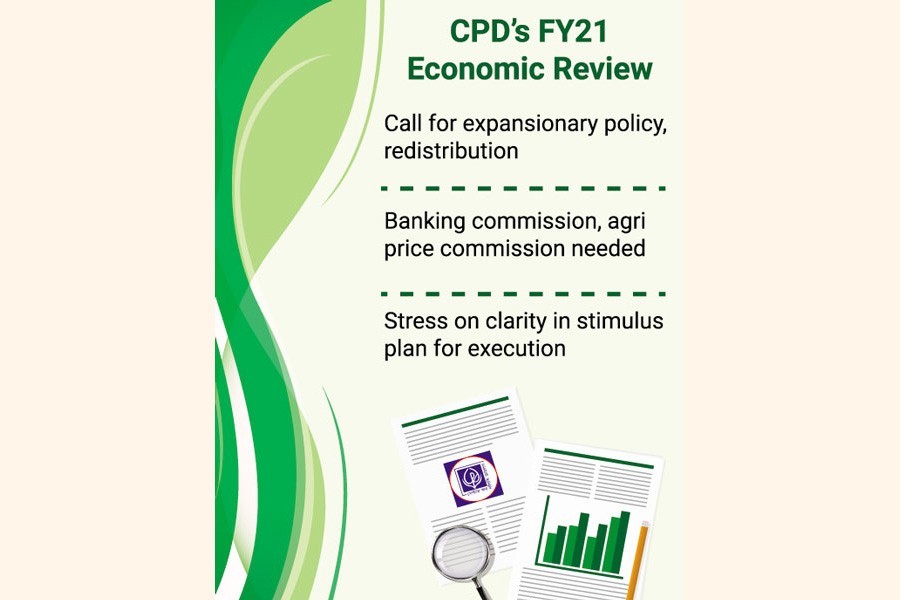
Published :
Updated :

The government's efforts to mitigate public sufferings and overcome the adverse impacts of coronavirus on the economy have been marred by institutional weaknesses and inability to implement its reform agenda.
"…the much-expected turnaround is still not there," the Centre for Policy Dialogue (CPD) said on Monday in its review of the economy and implementation progress of the budget for the current fiscal.
CPD senior research fellow Towfiqul Islam Khan presented the keynote styled 'State of the Bangladesh economy in FY 2020-21' during a virtual briefing.
He pointed out that the inherent weaknesses in the banking sector are undermining the government's efforts to trigger economic recovery through bank-dependent stimulus packages.
Despite signs of improvement, according to Mr Khan, the annual revenue mobilisation target is unlikely to be attained in the current fiscal year (FY).
The weak implementation of public expenditure continues this fiscal year which is "a matter of grave concern".
The ADP (annual development programme) expenditure remains sluggish this fiscal at only 48.7 per cent utilisation during the July-April period, said Mr Khan.
The industrial production growth was subdued, especially for small industries, he added.
The rising trends in food inflation and the state of healthcare are worrisome, particularly in view of the ongoing pandemic, as these are expected to adversely impact the low-income population disproportionately.
Mr Khan said the private-sector credit did not pick up despite stimulus packages.
Distribution of industrial term loans was lowered by 30.8 per cent and SME loans went down by 0.3 per cent during the first half of this fiscal.
The CPD said reaching the marginal groups and those who were left behind are proving to be difficult in the absence of effective local-level institutions and access to real-time data.
"Even during the pandemic," it said, "the much needed expansionary fiscal-budgetary policies could not be implemented because of continuing and endemic weaknesses of implementing agencies and line ministries."
As the government is about to place the budget for FY 2021-22, the leading private think tank suggested pursuing an expansionary fiscal policy and focusing on redistribution rather than economic growth.
It sought to prioritise social safety net, health and education, and CSME-oriented investment-augmenting measures in the public expenditure front in the budget.
The CPD suggested the government set up banking commission, agriculture price commission and competition commission "to create the foundations of a good-governed and well-functioning economy" to recover from the pandemic.
"The budget should set targets as regards employment and growth in income at the household level rather than GDP growth or per-capita income."
In its report, the CPD emphasised transparency and accountability of the stimulus plan for successful operationalisation and implementation.
"A large portion of people, who are actually poor and in dire need, didn't receive any form of support from the government -- whether in the form of relief items, liquidity support or fiscal stimulus," it pointed out.
According to the CPD, the stimulus packages provided through banks have created new avenues for corruption and malpractice.
"Liquidity support and fiscal stimulus packages rolled out without prior assessment of the ground realities may not be able to address the needs of the most vulnerable people in society."
CPD executive director Dr Fahmida Khatun said the urban poor were left behind while delivering assistance to face immediate pandemic-related challenges.
Urging to raise allocation for social safety net, she requested to spend at least 4.0 per cent of gross domestic product (GDP) on the protection of the poor.
Pointing out massive corruption in health sector, Dr Khatun said raising allocation for the sector would not be fruitful without enhancing their spending capacity.
CPD distinguished fellow Prof Mustafizur Rahman underscored the need for raising spending capacity of government's ministries and departments.
On inflation, he said the government's food procurement and import plans could not be implemented this year. The rate of inflation in case of rice has reached 20 per cent this year, said Mr Rahman.
CPD research director Dr Khondaker Golam Moazzem accentuated the need for forming various commissions to bring necessary reforms.
"The government has the tendency to avoid reforms," he observed.
syful-islam@outlook.com


 For all latest news, follow The Financial Express Google News channel.
For all latest news, follow The Financial Express Google News channel.